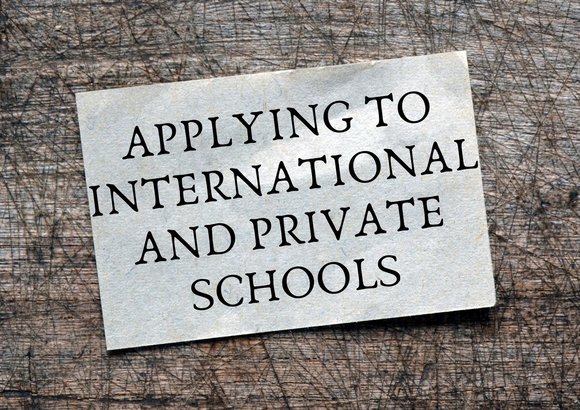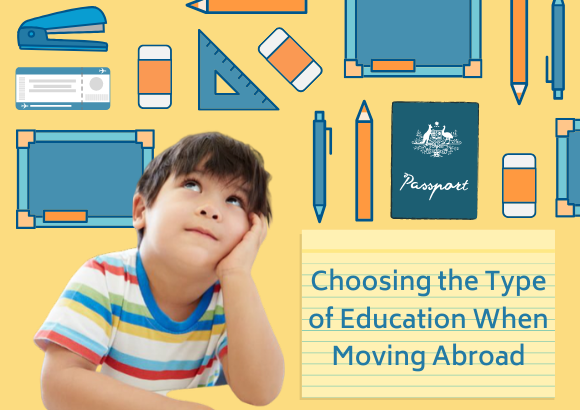Expatriate Parents
What Are the Steps Required to Apply to International Schools?
There are education advisors that assign an agent dedicated to assist in
your application process. Hiring an advisor is suggested if you have concerns and
questions regarding your child’s education. The advisor can help with all kinds of
requests, such as helping your child in choosing their course or finding accommodation
for your child if the school is far from home.
Most international schools will require the following steps:
Prepare the most recent school reports.
Prepare identification data, such as passports and birth certificates.
Some schools might request additional data, such as psychological testing results,
Individualized Education Programs (IEPs), English as Additional Language (EAL), Speech
and Language, and Occupational Therapy, Student Health Online form.
Some schools also have basic assessments to check your child’s academic standing.
If your child has not experienced an international syllabus prior to applying, there will
be English proficiency tests depending on their level (primary, secondary, or higher
education).
The application process has become a lot more simplified and you can even do the entire
process online in most cases. Check out your school’s website to find out more.
Expatriate Parents
I Want My Child To Learn Mandarin - What Schools Are Good for This?
Learning language is about how often it is practiced. If you are more
interested in active learning within an international school syllabus, you can check out
our article:
9 International Schools and the Foreign Language Options They Offer.
Another alternative is to study at a Chinese vernacular school. Your child will be
surrounded by other students that speak Mandarin and all subjects are taught in
Mandarin. Chinese schools are known for their rigorous focus on academics and
discipline.
If none of these options are suitable for you, the next best thing is to find a reputable
language centre near to your residential area. There are also many Chinese-language
tutors available online if going to class physically is not an option.
Do ask for personal recommendations via online expat forums to source your own tutor.
Mandarin is in very high demand and you will have no issues finding a good, experienced
tutor. Bonus points if the lessons are online - you can learn along with your children.
Expatriate Parents
What’s It Really Like Living In Malaysia? Hear From Expats
Themselves
Malaysia is a diverse country that is filled with people of different
nationalities comprising of the Malays, Chinese, Indians and various others. You can
practically find almost every kind of cuisine from different cultures.
Despite Bahasa Melayu being its national language, people in urban areas are mostly able
to communicate using English, which is convenient if English is your daily-spoken
language.
Malaysia provides real international experience. The country is the center of trading in
South East Asia. Tourists often visit the country and have a high regard of Malaysia as
a melting pot. Many of them choose to stay on and make Malaysia their second home.
There are a lot of international communities that you can find online or through
close-knit communities at your children’s schools or around your suburb.
There are misconceptions about living in Malaysia, such as it is cheap and life is easy.
This may or may not be true, depending on a lot of factors, such as your socio-economic
background, your interests and your ability to withstand spicy food and occasionally
extreme heat.
The best thing to do is not believe everything you read on the Internet, and come with an
open mind.
Expatriate Parents
I’m Worried About My Child Fitting In With the Locals and Adjusting
To Malaysian Culture
Lorem Ipsum is simply dummy text of the printing and typesetting industry.
Lorem Ipsum has been the industry's standard dummy text ever since the 1500s, when
Lorem Ipsum is simply dummy text of the printing and typesetting industry.
Lorem Ipsum has been the industry's standard dummy text ever since the 1500s, when
Expatriate Parents
Tapping into the expat community in Malaysia
To get in touch with your home country community, you can find them at
your child’s school. Schools often provide a platform for parents to have an independent
community that works alongside schools to improve a child's education experience.
For higher education (colleges and universities), students can attend club expos to find
their home country community. It is usually very easy to look for one since the
community itself will actively promote themselves whenever a new batch of students are
coming in.
You can also inquire about communities or associations from your respective embassy
before or upon your arrival in Malaysia.
Expatriate Parents
Schools That Offer Additional Assistance With Languages And/Or
Specific Needs
There are schools that are certified with the Dual-Language Programme
(DLP) in Malaysia, such as Zenith Private Schools and Garden International school.
Schools with DLP offer students the option to study in both English and Malay. For
details on the criteria of schools to adopt DLP, you can check out our article.
There are also international schools that offer students to pick two main foreign
languages in addition to their core subjects. For example, Elite International College
International school offers Bahasa Malaysia, Mandarin, and Spanish. You can check out
more schools here.
Expatriate Parents
Are Expats Permitted To Send Their Children To Private (as Opposed
to International) Schools?
Lorem Ipsum is simply dummy text of the printing and typesetting industry.
Lorem Ipsum has been the industry's standard dummy text ever since the 1500s, when
Lorem Ipsum is simply dummy text of the printing and typesetting industry.
Lorem Ipsum has been the industry's standard dummy text ever since the 1500s, when
Expatriate Parents
We Might Migrate Later But Are Unsure of Our Plans - What Is The
Best Option For Choosing A Syllabus?
International syllabus offers flexibility with credit transfer programmes.
Since international schools adopt the same syllabus across countries, it will be easier
to continue your child’s study despite moving around.
Most, if not all international syllabus are recognised around the world, and if not, you
can ask about the equivalent certifications required, depending on where you move to.
It’s always best to bring this up while you’re enrolling at the school of your choice.
The School Head might be able to guide you towards the best option, or offer
alternatives.
Expatriate Parents
Are There Schools That Accept Students After Intake Dates?
Many international and private schools are willing to accept students past
their intake dates because they understand the dilemma of travelling expats.
There are a few that are strict about intakes to minimise disruptions to other students,
but calling or checking the website of your school of choice is your best bet.
Expatriate Parents
I’m Completely New Here - How Do I Find Transporters For My
Children’s Commute To School?
The Klang Valley area does have a public transport system, but it is best
to arrange for private transportation for your child, especially if they are on a
schedule.
Check with your preferred school if they have options available - some of them already
have existing vendors.
For carpool, you can check out www.kidzcarpool.com.my for transport services.
Otherwise, asking around in online forums for parents, or tapping into your school’s
parent community might be useful. Best to stick to recommendations by people you know
however, which is a good way to ensure the quality and safety of the transporter.





